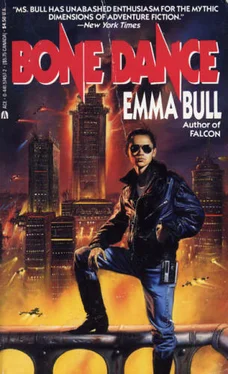She stuck her head back into the room and smiled. “I’m discreet, sugar.”
Without Dana, the room was much larger. Still, nothing in it seemed quite in focus. I stared at the wide-open roses in front of me. Down the hall I could hear, barely, the rise and fall of Dana’s voice as she talked on the phone. Finding me a corpse-removal service. I could probably have done it myself, if I wasn’t so rattled. But no—the telephone; this apartment, uncontestedly hers, filled with luxuries; the shop logo on the box; the tea—Dana had connections, of a sort I would never have expected. I knew people, from deals, from the Underbridge, but I couldn’t call them connections.
She came back in. “Where’s your place, sugar?”
“Why?”
“They’ll meet us there.”
I told her, because I couldn’t see any way not to. She went back down the hall.
When she returned, the teakettle had begun to hoot. She did appropriate things with kettle and teapot, and brought all the paraphernalia to the table.
“Shouldn’t we go?” I asked. If my privacy had to be invaded, it seemed better to get there first and prepare the ground.
“Drink your tea.” She poured, through a strainer, into two thin china cups that matched. For some reason, I thought of Sherrea, with no food in the house. I drank my tea, with milk in it.
It was beginning to catch up to me that I hadn’t had enough sleep. That would explain my inability to concentrate, the distance everything seemed to recede to. Dana watched me over the rim of her cup, wearing her purring look. The angle was flattering.
“Why do you treat Cassidy so badly?” I asked suddenly.
“ Do I treat him badly?” She sipped tea. “I don’t think I do. He’s one of my best friends, honey.”
“That’s not how he thinks of you.”
Left shoulder up, eyebrows raised, mouth pursed—it was such a graceful expression of regret that I couldn’t tell if it was genuine. “I can’t do anything about that.”
“You could stop giving him encouragement.”
“I treat him just the same as I treat you.”
“Ah, but I’m not your type.”
“Neither is Cassidy.”
“You should tell him so.”
She laughed. “Oh, Sparrow, honey, when did you start up in the lonely-hearts business? I thought you didn’t mess with romance.” She put the emphasis heavily on the first syllable, and grinned.
It was true; it wasn’t my place, my right, or my business. I turned my teacup around between my hands. I hadn’t had caffeine for months. I could almost feel my blood vessels narrowing.
“Cassidy,” she continued, “is having himself a fine time. He’ll collect just enough heartbreak, and then he’ll get tired of it and give up. In the meantime, he’s getting a little excitement, and not taking any harm. D’you want anything to eat with that?”
I shook my head. Dana pushed my cup gently down on the saucer and filled it again. It was time we left. I pointed to the wicker table and the draped figurine. “I didn’t know you were hoodoo.”
She raised her eyebrows again. “Sugar, we’re all hoodoo, aren’t we? Or whatever works.”
“What makes you think it works?”
“That it does, I suppose. I mean, you turn the fire on under the pot and it boils, doesn’t it?”
“Does it? What are you asking for?”
She smiled. “None of your damn business.”
This time she didn’t refill my teacup.
There was a car in front of the building when we got there: long as the course of history, black as a killer’s thoughts, and damnably familiar. “Wait,” I said, reaching for Dana’s arm. I missed it.
“They’re here. That’s the car.”
I watched her cross the street to the front door, and followed slowly after. Someone who’d been looking for Mick Skinner was about to find him. Or maybe Mick Skinner had successfully avoided someone he didn’t want to see. It all depended on your point of reference. Mine, I decided with a sinking feeling, was too close to the action. But there wasn’t much I could do now.
Two figures commanded the ruined grandeur of the lobby. One was a teak-brown man, nearly seven feet tall, carved with muscle and shining bald. He wore narrow trousers and a sleeveless double-breasted tunic with silver buttons; tunic and pants were black, and suggested a uniform without insisting on it. He had a baroque pearl hanging from his right earlobe. His arms hung loose at his sides, his hands open; he looked as if he was thinking about matters several miles away. On the floor at his feet was a leather case with a handle, like an old salesman’s catalog case.
The woman next to him seemed small only in contrast. She had to be the owner of the car—she belonged in something that long, that black, that silent. She was black herself; I’d never seen skin so dark. She wore a long dress, almost to her ankles, of dull dark blue chiffon over a dark blue slip. Her hair was hidden under a sheenless black scarf wrapped close around her head. Her long, angular face was interrupted by sunglasses with dark lenses and matte-black frames. Even her lipstick was black, and didn’t shine. I was afraid to look at her fingernails.
“ Cherie ,” she said to Dana with regal near-warmth. Her voice was low and hoarse. Against all that darkness, Dana, in a hyacinth-blue dress, looked like a faded print.
“ Bonjour, Mattresse ,” said Dana, in a startling schoolgirl voice. I glanced at her face and found an expression there to match. “This is Sparrow, who… has the problem.”
I was about to say something snappy—mostly to banish the urge to bob or tug my forelock—when I realized that the black woman had gone very still. I couldn’t tell what held her attention because of the sunglasses. I shot a look over my shoulder.
“Sparrow. Bonjour. What is your age?”
My heart gave one powerful beat and seemed to quit. “Old enough for most things.”
“Where have you come from?”
“I don’t think that’s relevant.”
“Sparrow!” Dana said.
But the black woman shrugged. “Keep your secrets, then, if you feel better. It doesn’t matter. Take me to this dead man.”
“Shall I call you Mistress, too?”
“When you need to call me anything, I will tell you what it will be,” she said pleasantly.
Gosh. Since there were no more channels for the small talk to run in, I led them all to the basement.
Again, I stood in the elevator in such a way that no one else could see what I did with the loose wires in the control box. I knew it was a delaying tactic; one of them could, with enough incentive and time, duplicate the process. I hated knowing that. Three more people who were aware that the elevator was not broken down. Mick Skinner seemed to be doing me all his disservices posthumously.
The apartment door was still locked. The apartment, when I opened the door, was quiet as—well, perfectly quiet. Dana came in after me, followed by La Maitresse and the large man. He closed the door after himself, which made me uncomfortable.
When I opened the bedroom door, I knew immediately that something had changed state. Mick Skinner’s mortal remains were where I’d left them. But the body seemed altered; maybe in its color, or the texture of the skin. I stepped in and plucked gingerly at the wrist I’d lifted before, and found that this time rigor mortis worked. “He’s different.”
Dana was standing in the doorway, staring. The woman pushed her gently out of the way and came to the bedside. “How?”
“Well… deader,” I said.
I found myself staring at my reflection in the sunglasses, long enough to realize that my way with words had not impressed her. “I need more room,” she said at last. “Can you give it to me?”
Читать дальше












